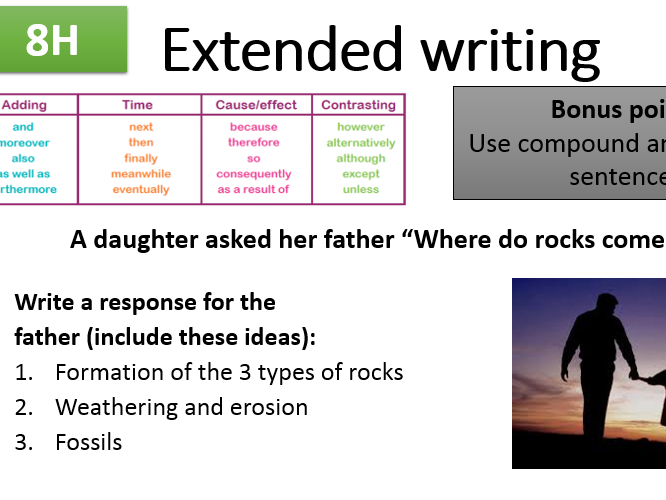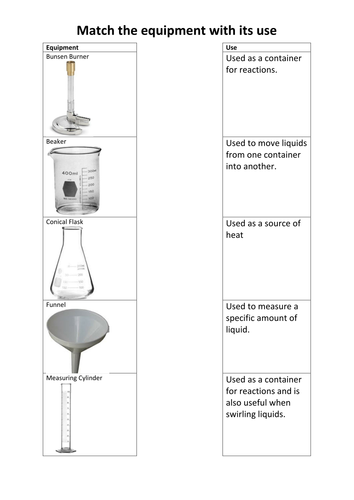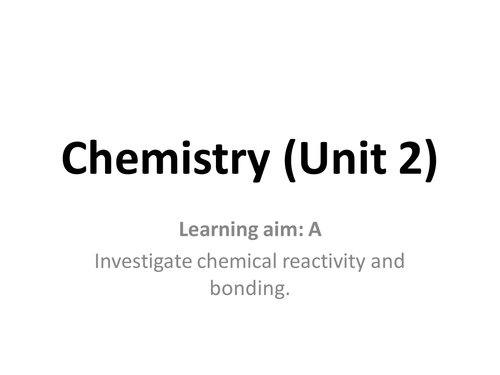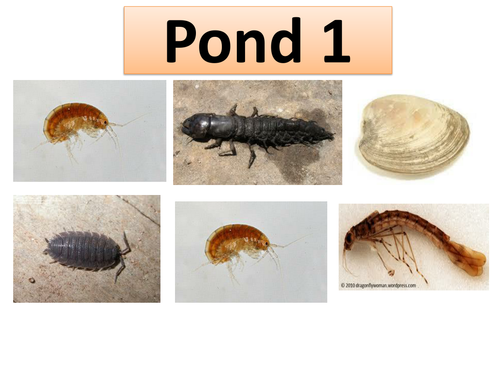243Uploads
112k+Views
55k+Downloads
All resources

C2.2 Electronic structure and the periodic table
AQA GCSE Sciences (9-1)
Chemistry: C2 The periodic table
Lesson 2: C2.2 Electronic structure and the periodic table
Based on the Kerboodle Resources
The AQA Kerboodle worksheet are not included so as to be acting within the TES code of conduct.
Keywords: Shells, Electronic structure, Noble gases

B2.2 Growth and differentiation
AQA GCSE Sciences (9-1)
Biology: B2 Cell division
Lesson 2: B2.2 Growth and differentiation
Based on the Kerboodle Resources
The AQA Kerboodle worksheet are not included so as to be acting within the TES code of conduct.
Keyword: Differentiate, Stem cell, Cloning, Adult stem cell
Bundle

B17 Organising an ecosystem
Save £2 (33%)
Includes:
B17.1 Feeding relationships
B17.2 Materials cycling
B17.3 The Carbon Cycle
Please note: I had to remove the AQA worksheets so as to abide by TES’s code of conduct. Only my worksheets and PPT are included.

B14.4 Genetic engineering
AQA GCSE Sciences (9-1)
Biology: B14 Variation and evolution
Lesson 4: B14.4 Genetic engineering
Based on the Kerboodle Resources
The AQA Kerboodle worksheet are not included so as to be acting within the TES code of conduct.
Keywords: Plasmid, Enzymes

C4.6 Expressing concentrations
AQA GCSE Sciences (9-1)
Chemistry: C4 Chemical calculation
Lesson 5: C4.6 Expressing concentrations
Based on the Kerboodle Resources
The AQA Kerboodle worksheet are not included so as to be acting within the TES code of conduct.

C4.3 From masses to balanced equations
AQA GCSE Sciences (9-1)
Chemistry: C4 Chemical calculation
Lesson 3: C4.3 From masses to balanced equations
Based on the Kerboodle Resources
The AQA Kerboodle worksheet are not included so as to be acting within the TES code of conduct.

B11.1 Principles of hormonal control
AQA GCSE Sciences (9-1)
Biology: B11 Hormonal coordination
Lesson 1: B11.1 Principles of hormonal control
Based on the Kerboodle Resources
The AQA Kerboodle worksheet are not included so as to be acting within the TES code of conduct.
Keywords: Endocrine system, Hormones, Insulin, Adrenaline, ADH

KS3 Science Complete Extended Writing Task (Yr7-8)
Best used just before or after finishing a topic - an ideal activity for deep marking.
Each slide contains a set of connective and also prompt ideas.
Topics included:
* Adaptation, Neutralisation, Particle theory, Detecting sound, Puberty, Drugs and health, Fossil fuels.
* Respiration, Rock cycle, Payback-time, Digestion, Diffusion, Acidification of forests, Pollination, Earth and space

C11.1 Addition polymerisation
AQA GCSE Sciences (9-1)
Chemistry: C11 Polymers
Lesson 1: C11.1 Addition polymerisation
Based on the Kerboodle Resources
The AQA Kerboodle worksheet are not included so as to be acting within the TES code of conduct.

P10.2 Weight and terminal velocity
AQA GCSE Sciences (9-1)
Physics: P10 Force and motion
Lesson 2: P10.2 Weight and terminal velocity
Based on the Kerboodle Resources
The AQA Kerboodle worksheet are not included so as to be acting within the TES code of conduct.

C3.6 Properties of small molecules
AQA GCSE Sciences (9-1)
Chemistry: C3 Structure and bonding
Lesson 6: C3.6 Properties of small molecules
Based on the Kerboodle Resources
The AQA Kerboodle worksheet are not included so as to be acting within the TES code of conduct.

C3.10 Properties of metals and alloys
AQA GCSE Sciences (9-1)
Chemistry: C3 Structure and bonding
Lesson 10: C3.10 Properties of metals and alloys
Based on the Kerboodle Resources
The AQA Kerboodle worksheet are not included so as to be acting within the TES code of conduct.

P10.3 Forces and braking
AQA GCSE Sciences (9-1)
Physics: P10 Force and motion
Lesson 3: P10.3 Forces and braking
Based on the Kerboodle Resources
The AQA Kerboodle worksheet are not included so as to be acting within the TES code of conduct.
Keywords: Stopping distance, Thinking distance, Braking distance

B8.2 The rate of photosynthesis
AQA GCSE Sciences (9-1)
Biology: B8 Photosynthesis
Lesson 2: B8.2 The rate of photosynthesis
Based on the Kerboodle Resources
The AQA Kerboodle worksheet are not included so as to be acting within the TES code of conduct.
Keywords: Limiting factor, Denatured, Enzymes

C11.2 Condensation polymerisation
AQA GCSE Sciences (9-1)
Chemistry: C11 Polymers
Lesson 2: C11.2 Condensation polymerisation
Based on the Kerboodle Resources
The AQA Kerboodle worksheet are not included so as to be acting within the TES code of conduct.

Safety and Scientific Equipment (Introduction lesson 3/4)
Designed to be the third lessons for Year 7s (3/4).
Learning outcomes:
(*) Describe the use of different lab equipment.
(*) Identify the appropriate lab equipment for an investigation.
(*) Identify safety issues in an unsafe environment.
Students will learn the common equipment they will encounter in the lab and their function.
They will also learn how to measure liquids using equipment that form a meniscus.
There are also safety rules and also how to light a Bunsen Burner

NEW BTEC First Principles of Applied science
Coursework section. Before each task I'll give a brief introduction with some questions so they get use to the knowledge in the topic. These worksheets detail the scenarios and work that should be present in their coursework. Given to students at the start - may be good to also give them a due date for each task. It is probably best to have access to laptops/pcs. GOOD LUCK GUYS *LOVELY BTEC*!!!!!!!!!

Flames test (Game of thrones)
Have strontium, copper, and iron solution in spray bottles. This will be the saliva of your dragons and they will give the distinctive colours. Now pupils perform flames test with known compounds to match up the colours and identify ions present in your dragon saliva.

Pollution indicators
Main activity will be pupils identifying different organisms in six ponds and using their keys to find the cleanest drinking water.




















